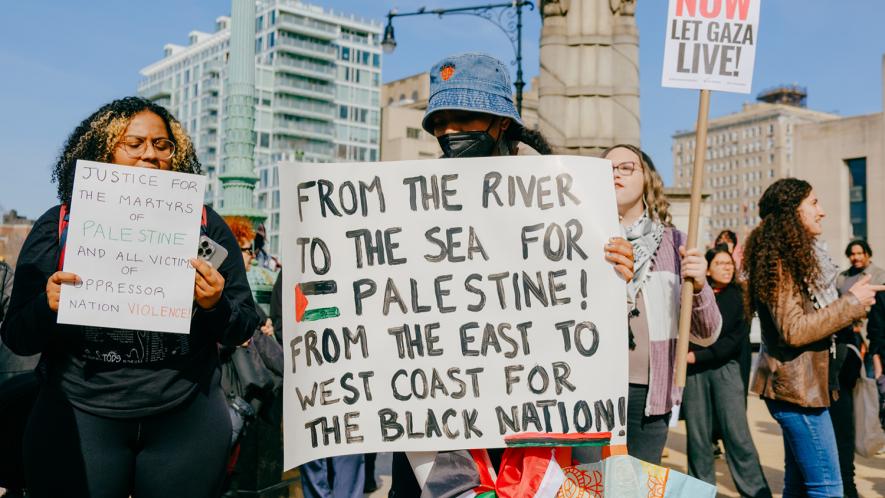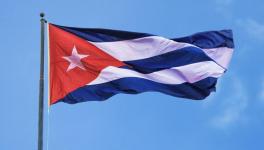A Red Line Against Genocide, a Red Line Against Racism

Photo: Wyatt Souers
On April 12, 1950, when the US Senate Committee on Foreign Relations met to discuss the Genocide Convention (which had passed in the UN General Assembly a year earlier), the senators were most anxious to inoculate the US from charges of genocide, particularly for its traditions of racist violence.
Philip Perlman, the Solicitor General, maintained that “genocide, as defined in this convention, has never been committed in this country, and there are no indications that it ever will be.” Raphael Lemkin, who had framed the concept of genocide, sent a letter to the committee definitively stating that in his view, the genocide convention did not apply to lynchings or race riots. A “casual lynching,” Lemkin explained, was “local terrorism,” not genocidal. He assured the senators that “genocide is a crime which does not happen in the US. It is like African leprosy. This country is called upon to cooperate in fighting this disease for humanitarian and defensive reasons only.”
On May 23, the committee again discussed the genocide convention. Senator McMahon of Connecticut, asserted without evidence that “the Russians” were at that moment engaged in genocide against Estonians, Latvians, Polish people, and Ukrainians. Adrian Fisher, who had provided legal assistance for Japanese American internment, assured the senators that “a race riot is not an act of mass murder or genocide.”
Mr. Perlman tried to address “the practical objection, the thing that is behind a lot of people’s minds on this convention… is it aimed at lynching in the South.” He reassured the senators that the genocide convention “has nothing to do with lynching.” Senators McMahon and Smith of New Jersey wondered, if the Soviet Union brought the US before the International Court of Justice after a race riot, would the US be bound to its rulings? Perlman affirmed that if US courts had considered the ICJ ruling and found it “no good,” then “there is nothing that anyone could do about it.” The US was not bound to respect any higher legal authority.
Despite these assurances, Congress declined to ratify the genocide convention over the following decades. In September 1984, the Committee on Foreign Relations again discussed the ratification of the convention, this time at the urging of President Reagan. Senator Joseph Biden, voicing his skepticism about the sincerity of Reagan’s support in the closing weeks of an election year, insisted nonetheless that as “the father of the right wing… the father of the radical right in America,” Reagan’s ability to outflank recalcitrant senators in key positions, like Jesse Helms and Strom Thurmond, made this “a great opportunity” to pass the genocide convention.
This instinct to outflank the right shaped Biden’s May 31 speech, revealing the details of a “comprehensive new proposal” that he described as being offered by Israel.
On May 22, the Lemkin Institute for Genocide Prevention issued its eighth SOS alert on Gaza, expressing profound dismay “at the lackluster effort to end Israel’s devastating war and genocide.” As famine has set in, over 80% of civilian infrastructure has been destroyed, and virtually every Palestinian living in Gaza has been displaced, while “any hope of the international community stepping up and putting even the slightest modicum of pressure on the Israeli state has yet to materialize.” Hamas, they noted, had accepted the terms of a ceasefire agreement on May 6, which Israeli forces refused, instead seizing the Rafah crossing, the entry point for almost all humanitarian aid into Gaza, the following day.
“Israel’s chief patron, the United States” they pointed out, “has done little to prevent the invasion of Rafah.” The Biden administration had instead prepared a $1 billion arms shipment, including tank shells, tactical vehicles, and mortars, which would help Israeli forces “to push further into Rafah while also re-invading northern Gaza.”
Two days later, on May 24, the International Court of Justice ruled that “Israel must immediately halt its military offensive, and any other action in the Rafah Governorate,” open the Rafah crossing to humanitarian aid, and allow unimpeded access to UN investigators researching allegations of genocide. Israel and its international backers, including the US, are currently in breach of this ruling from the International Court of Justice.
On June 8, thousands will gather to form a red line around the White House, insisting on the universal application of human rights for all people, including Palestinians. It is clear that in the Biden White House, there are no red lines against genocide in Gaza, just as there are no red lines against child poverty, hunger, unsafe water, or police brutality within US borders. In the midst of a genocide, during a presidential election, the people’s red line against genocide in Palestine will also be a red line for genuine democracy in North America. Join a bus to Washington, DC, this Saturday, to help build the line for peace, against racism and genocide.
Manu Karuka is the author of Empire’s Tracks: Indigenous Nations, Chinese Workers, and the Transcontinental Railroad (University of California Press). He is a member of the editorial board of 1804 Books.
Get the latest reports & analysis with people's perspective on Protests, movements & deep analytical videos, discussions of the current affairs in your Telegram app. Subscribe to NewsClick's Telegram channel & get Real-Time updates on stories, as they get published on our website.
























